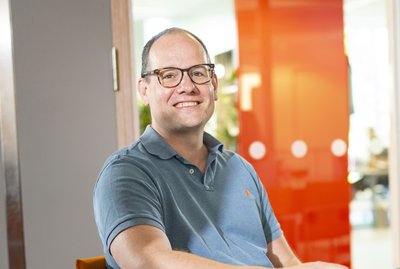In the coming years, the consortium will create a shared infrastructure – an assembly line for brain technology – where scientists can design smarter brain-machine interfaces, test advanced implants and develop digital brain models. Together, these tools will help researchers better understand how the brain works and pave the way for new therapies for neurological and psychiatric disorders.
Neurotechnology – devices that can read out or influence brain activity – has advanced rapidly in recent years. But integrating these technologies remains a major challenge.
A striking example is a brain-computer interface (BCI) that records brain signals from a paralysed person and converts them into commands to control a robotic arm. While promising, current BCIs are bulky, slow and limited in how much information they can handle.
CWI’s leading role in the software platform

EBRAINS-Neurotech aims to change that. Through a coordinated chain of laboratories across the Netherlands, researchers will develop smaller, faster and more powerful brain interfaces. EBRAINS-Neurotech will consist of a Hardware, Software and Neuroscience & Ethics Platform. CWI will contribute to the Software platform, specifically the task of bringing large-scale brain models to local, energy-efficient hardware. To do so, large-scale models of neural networks have to be compressed into efficient algorithms that run on very small and power-constrained on-board processors, such as neuromorphic chips, operating in the direct vicinity of subjects. This is essential for truly wearable or implantable devices. The facility will therefore create software to build abstract, reduced models of the brain tissue targeted for interfacing, allowing implants to learn continuously and adapt as the stimulated neural circuits change over time. ‘Our expertise at CWI in compressing neural network models into energy-efficient algorithms is a crucial link to building these smarter, continuous-learning implants’ says Professor Sander Bohté, head of CWI’s Machine Learning group. Professor Bohté, who will lead one of the facilities of the Software platform, adds: ‘I am delighted with this funding from NWO- LSRI, because it will generate fundamental insights into clinical aspects and neurodegenerative disorders like stroke, depression, epilepsy, and Alzheimer's.’
Smaller, smarter and smaller devices
EBRAINS-Neurotech will expand the number of electrodes for recording brain signals, improve implant durability and increase stimulation points for more precise control of neural circuits. Devices will be miniaturised using nanotechnology, allowing them to be placed on the body to process brain signals directly, much like a pacemaker does with the heart.
‘Our goal is to make neurotechnological devices not only more effective, but also more practical for patients and researchers,’ says professor Cyriel Pennartz of the University of Amsterdam (UvA), coordinator of the consortium. ‘By combining advances in nanotechnology, neuroscience and computing, we can build implants that work better and last longer.’
Researchers will combine optogenetics – using light to activate neurons – with large-scale recordings of brain activity to better understand how brain circuits work in mediating sensations, cognition and motor behaviour.
The project will also use neuromorphic chips, which mimic how neurons process information. These chips are faster and more energy-efficient than traditional computers, making them a sustainable alternative to power-hungry AI systems.
Responsible innovation
Beyond technology, EBRAINS-Neurotech will also focus on the ethical and societal implications of neurotechnology. Researchers will study how to protect data privacy, reduce biases in algorithms and ensure brain stimulation methods remain safe and responsible.
‘It’s crucial that these powerful technologies are developed responsibly,’ says Pennartz. ‘We want to make sure innovation goes hand in hand with safety, fairness and transparency.’
About EBRAINS-Neurotech
EBRAINS-Neurotech will work closely with the European digital brain research platform EBRAINS and other (inter)national consortia. The consortium includes: University of Amsterdam (lead), University of Twente, Delft University of Technology, Netherlands Institute for Neuroscience, Radboud University Nijmegen, Centrum Wiskunde & Informatica (CWI), University of Groningen, University Medical Centre Utrecht, Erasmus University Medical Centre. The consortium will also cooperate with partners in the following Dutch institutions: Technical University Eindhoven, University of Maastricht, Leiden University Medical Center, Amsterdam University Medical Centre, the Health Research Infrastructure and the eScience Centre.
Bron header photo: Shuttersttock
